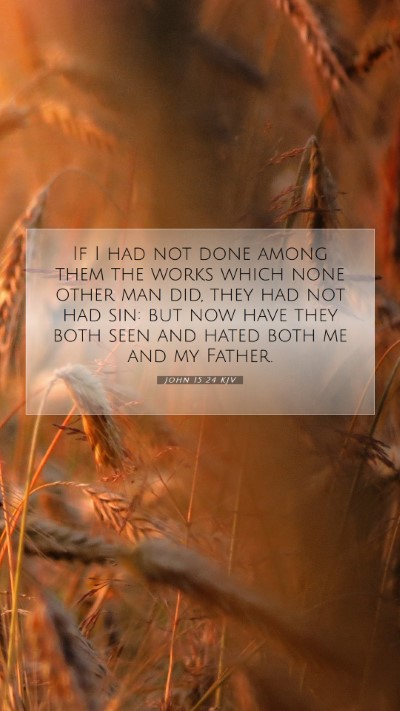Old Testament
Genesis Exodus Leviticus Numbers Deuteronomy Joshua Judges Ruth 1 Samuel 2 Samuel 1 Kings 2 Kings 1 Chronicles 2 Chronicles Ezra Nehemiah Esther Job Psalms Proverbs Ecclesiastes Song of Solomon Isaiah Jeremiah Lamentations Ezekiel Daniel Hosea Joel Amos Obadiah Jonah Micah Nahum Habakkuk Zephaniah Haggai Zechariah MalachiJohn 15:24 Meaning
What is the meaning of John 15:24?
If I had not done among them the works which none other man did, they had not had sin: but now have they both seen and hated both me and my Father.
John 15:24 Bible Verse Meaning
Understanding John 15:24
John 15:24 states: "If I had not done among them the works which none other man did, they had not had sin: but now have they both seen and hated both me and my Father."
Summary of the Verse
This verse captures a profound truth about the rejection of Jesus Christ by the world despite the miracles and works He performed, which were unmatched by any other. The statement emphasizes the heightened responsibility of those who witness such acts, as they are now without excuse in their disbelief.
Commentary Insights
-
Matthew Henry:
Henry discusses the significance of Jesus' miracles as evidence of His divine authority. He implies that the rejection of Christ by those who directly witnessed His works exemplifies a critical hardness of heart, as they had the clearest revelation of God’s power.
-
Albert Barnes:
Barnes examines the implications of "had not had sin," indicating that sin here relates to a willful rejection of God after having seen His works. This denotes a greater culpability due to the awareness of His divine nature through miracles.
-
Adam Clarke:
Clarke elaborates on the contrast between the works of Jesus and those of other prophets, emphasizing that such miraculous acts were intended to draw people toward faith. The hatred against Him represents a profound spiritual blindness.
Key Themes
Several key themes arise from John 15:24:
- The Authority of Christ: Jesus’ miracles serve as evidence of His divine mission.
- The Nature of Sin: The verse indicates a transition from ignorance to willful sinfulness upon witnessing divine acts.
- Rejection and Hatred: It highlights the unavoidable reality of opposition faced by those who embody truth.
Cross References
Related biblical texts that provide further insight include:
- Matthew 11:20-24: Discusses woe to unrepentant cities despite witnessing Jesus’ miracles.
- Luke 10:13-16: Jesus laments over cities that rejected Him, reflecting a similar theme of accountability after witnessing divine acts.
- Hebrews 10:26-29: Discusses judgment for those who willfully sin after receiving the knowledge of truth.
Practical Application
This verse calls for self-examination in the context of belief and disbelief. It emphasizes the importance of responding to God’s revelations positively and the danger of hardening one's heart against the truth.
Conclusion
John 15:24 serves as an essential Scripture that compels readers to understand the significance of witnessing God's works and the profound consequences that follow if one chooses to reject them. In light of its themes and teachings, it encourages believers to reflect on their response to the divine revelation presented through Jesus.
Further Bible Study Resources
For those interested in deepening their understanding of Scripture, consider exploring:
- Bible study groups that focus on the teachings of Jesus.
- Online Bible study tools for individual research.
- Bible study guides that explain complex passages.


